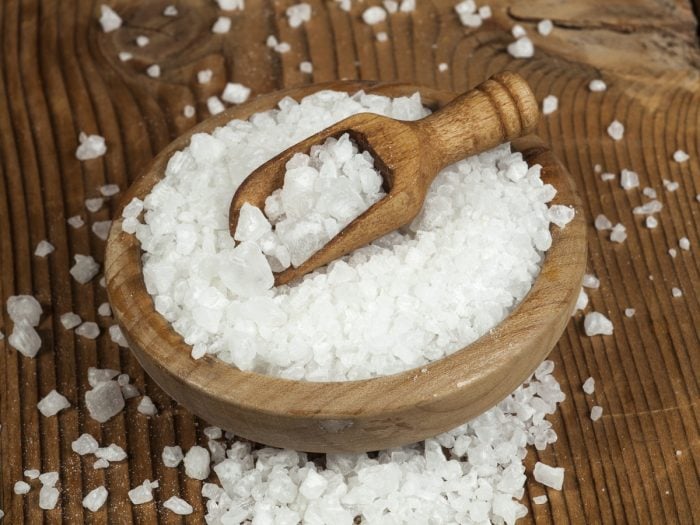Sodium benzoate is a manmade additive that can be found in various preserved foods, condiments, medicines, and beverages, and may represent a potential health risk when consumed in excess.
What is Sodium Benzoate?
Sodium benzoate is a synthetic additive and preservative made by combining benzoic acid and sodium hydroxide. It is a crystalline, odorless powder that dissolves in water. While sodium benzoate does not occur naturally in large numbers, it may be found in trace amounts in apples, plums, and cinnamon. Benzoic acid, however, is found in various plants and berries and is also a byproduct of certain bacterial reactions. [1]
Uses
There are a number of commercial uses of sodium benzoate, primarily in the food and medical industries.
- Sodium Benzoate in Food & Beverage: This is the first additive ever approved by the FDA for inclusion in food, as it is able to prevent the growth of bacteria, mold, and other microbes. This will decrease the likelihood of spoilage and preserve the food for longer periods of time. It is particularly effective in highly acidic foods, such as lemon juice, soda, and pickles. You will also find sodium benzoate in a variety of salad dressings, condiments, jellies, jams, pies, and soy sauce. In terms of beverages, you will often find this sodium salt in soft drinks, particularly diet sodas. This source of sodium benzoate also poses a number of risks, which will be explained below. [2]

Over-consumption can lead to side effects. Photo Credit: Shutterstock
- Sodium Benzoate in Medicine: The preservative nature of this compound makes it an effective ingredient in cough syrups and as a structural component in gel capsules. Additionally, more concentrated levels of sodium benzoate may be prescribed if you have high levels of certain toxins in the body. [3]
Health Risks of Sodium Benzoate
There is a great deal of contention surrounding this compound for various reasons.
- Benzene: Firstly, this derivative of benzoic acid has the potential to form benzene—a known carcinogen—under certain conditions. More specifically, benzene can form when sodium benzoate is exposed to ascorbic acid, more commonly known as vitamin C. This combination can be found in certain diet soft drinks, and while many companies have stopped using this sodium salt as an additive, it is still present in some drinks. Extended storage periods and exposure to heat and light can also increase benzene production. Anything over 5ppb (parts per billion) of benzene is considered unsafe for drinking water by the Environmental Protection Agency (EPA, the USA). [4] [5]
- Over-consumption: Aside from the fears of benzene forming in diet sodas, sodium benzoate itself has been linked with inflammation, problems with appetite control, issues with the nervous system, and increased levels of oxidative stress. However, research has shown that the amount of this sodium salt necessary to cause these types of symptoms is often more than 100 times the level normally found in food as an additive. For wary consumers, be sure to avoid foods with high levels of this compound or those that also contain ascorbic acid. Some people may also experience allergic reactions when consuming an excessive amount of this substance. [6]
Benefits
In terms of industrial and manufacturing purposes, sodium benzoate has a number of benefits. It is also a useful preservative in cosmetic products, such as toothpaste, hair products, and mouthwash, as well as in plastic manufacturing, as it can increase strength and durability. This compound also finds some use in the automotive industry, as it can prevent corrosion! [7]
As mentioned above, this compound is popular because it is inexpensive to produce and versatile, lacking any odor or flavor, and easily soluble in water. By preventing the growth of bacteria and mold, this preservative protects our food (and our bodies!) from these unwanted microbes.
In certain situations, such as cases of vascular headaches, larger amounts of this compound may be prescribed by a doctor, as demonstrated in this study published in Biological Psychiatry. However, these high levels are for therapeutic, short-term purposes only. [8]
Daily Dosage
The majority of this compound in your diet will come through your foods, rather than through its inclusion in certain pharmaceuticals. Provided you follow a normal diet, and are aware of those products high in this compound, you should limit your intake to 0-5mg of sodium benzoate/kilogram of body weight.
When taken for medicinal purposes, tablet dosages range from 50mg-500mg, but high dosages are only appropriate for singular conditions, such as inherited urea cycle disorders, in which the body is unable to process amino acids, and must, therefore, decrease the level of ammonia in the body. [9]
